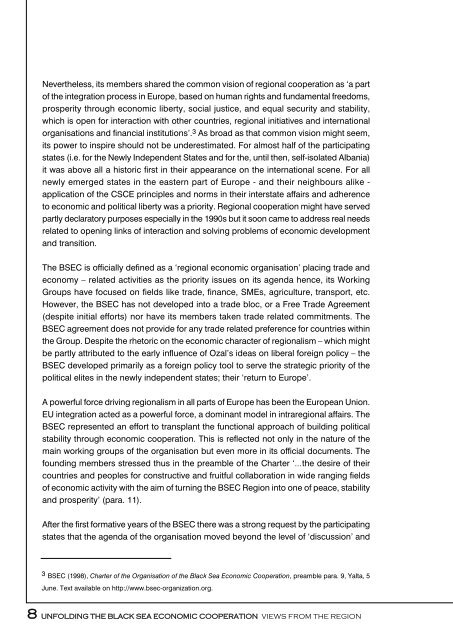Xenophon Paper 2 pdf - ICBSS
Xenophon Paper 2 pdf - ICBSS
Xenophon Paper 2 pdf - ICBSS
Create successful ePaper yourself
Turn your PDF publications into a flip-book with our unique Google optimized e-Paper software.
Nevertheless, its members shared the common vision of regional cooperation as ‘a part<br />
of the integration process in Europe, based on human rights and fundamental freedoms,<br />
prosperity through economic liberty, social justice, and equal security and stability,<br />
which is open for interaction with other countries, regional initiatives and international<br />
organisations and financial institutions’. 3 As broad as that common vision might seem,<br />
its power to inspire should not be underestimated. For almost half of the participating<br />
states (i.e. for the Newly Independent States and for the, until then, self-isolated Albania)<br />
it was above all a historic first in their appearance on the international scene. For all<br />
newly emerged states in the eastern part of Europe - and their neighbours alike -<br />
application of the CSCE principles and norms in their interstate affairs and adherence<br />
to economic and political liberty was a priority. Regional cooperation might have served<br />
partly declaratory purposes especially in the 1990s but it soon came to address real needs<br />
related to opening links of interaction and solving problems of economic development<br />
and transition.<br />
The BSEC is officially defined as a ‘regional economic organisation’ placing trade and<br />
economy – related activities as the priority issues on its agenda hence, its Working<br />
Groups have focused on fields like trade, finance, SMEs, agriculture, transport, etc.<br />
However, the BSEC has not developed into a trade bloc, or a Free Trade Agreement<br />
(despite initial efforts) nor have its members taken trade related commitments. The<br />
BSEC agreement does not provide for any trade related preference for countries within<br />
the Group. Despite the rhetoric on the economic character of regionalism – which might<br />
be partly attributed to the early influence of Ozal’s ideas on liberal foreign policy – the<br />
BSEC developed primarily as a foreign policy tool to serve the strategic priority of the<br />
political elites in the newly independent states; their ‘return to Europe’.<br />
A powerful force driving regionalism in all parts of Europe has been the European Union.<br />
EU integration acted as a powerful force, a dominant model in intraregional affairs. The<br />
BSEC represented an effort to transplant the functional approach of building political<br />
stability through economic cooperation. This is reflected not only in the nature of the<br />
main working groups of the organisation but even more in its official documents. The<br />
founding members stressed thus in the preamble of the Charter ‘…the desire of their<br />
countries and peoples for constructive and fruitful collaboration in wide ranging fields<br />
of economic activity with the aim of turning the BSEC Region into one of peace, stability<br />
and prosperity’ (para. 11).<br />
After the first formative years of the BSEC there was a strong request by the participating<br />
states that the agenda of the organisation moved beyond the level of ‘discussion’ and<br />
3 BSEC (1998), Charter of the Organisation of the Black Sea Economic Cooperation, preamble para. 9, Yalta, 5<br />
June. Text available on http://www.bsec-organization.org.<br />
8 UNFOLDING THE BLACK SEA ECONOMIC COOPERATION VIEWS FROM THE REGION









